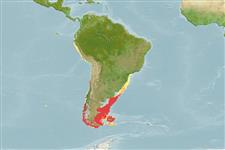इलाज़मौबरांकी (शारक और रेज़) (sharks and rays) >
Rajiformes (Skates and rays) >
Arhynchobatidae (Softnose skates)
Etymology: Psammobatis: Greek, psammos = sand + Greek, batis, batidos = a ray (Raja sp.) (Ref. 45335).
More on author: Günther.
Environment: milieu / climate zone / depth range / distribution range
पारिस्थितिकी
समुद्री ड़िमरसल. Temperate
Southeast Pacific and Southwest Atlantic: Chile and Argentina.
आकार / वज़न / Age
Maturity: Lm ? range ? - ? cm
Max length : 50.0 cm TL पुल्लिंग / अलिंग; (Ref. 126345); अधिकतम प्रकाशित वज़न: 910.00 g (Ref. 126345)
Oviparous. Distinct pairing with embrace. Young may tend to follow large objects, such as their mother (Ref. 205). Eggs are oblong capsules with stiff pointed horns at the corners deposited in sandy or muddy flats (Ref. 205). Egg capsules are 5.7 cm long and 3.4 cm wide (Ref. 41249).
Life cycle and mating behavior
परिपक्व अवधि | पुनरुत्पत्ति | मछलीऔ का अंडे देना | अंडे | Fecundity | लार्वा
Oviparous, paired eggs are laid. Embryos feed solely on yolk (Ref. 50449). Distinct pairing with embrace. Young may tend to follow large objects, such as their mother (Ref. 205).
McEachran, J.D. and K.A. Dunn, 1998. Phylogenetic analysis of skates, a morphologically conservative clade of elasmobranchs (Chondrichthyes: Rajidae). Copeia 1998(2):271-290. (Ref. 27314)
IUCN Red List Status (Ref. 130435: Version 2024-2)
Threat to humans
Harmless
Human uses
साधन
Special reports
Download XML
इंटरनेट स्रोत
Estimates based on models
Preferred temperature (Ref.
123201): 5.6 - 12.1, mean 7.9 °C (based on 156 cells).
Phylogenetic diversity index (Ref.
82804): PD
50 = 0.5039 [Uniqueness, from 0.5 = low to 2.0 = high].
Bayesian length-weight: a=0.00513 (0.00309 - 0.00850), b=3.07 (2.93 - 3.21), in cm total length, based on LWR estimates for this species & (Sub)family-body (Ref.
93245).
Trophic level (Ref.
69278): 3.8 ±0.7 se; based on size and trophs of closest relatives
लौटाव (Ref.
120179): निम्न, न्यूनतम जनसंख्या दुगनी होने का समय 4.5 - 14 वर्ष। (Fec assumed to be <100).
Fishing Vulnerability (Ref.
59153): Moderate vulnerability (40 of 100).
